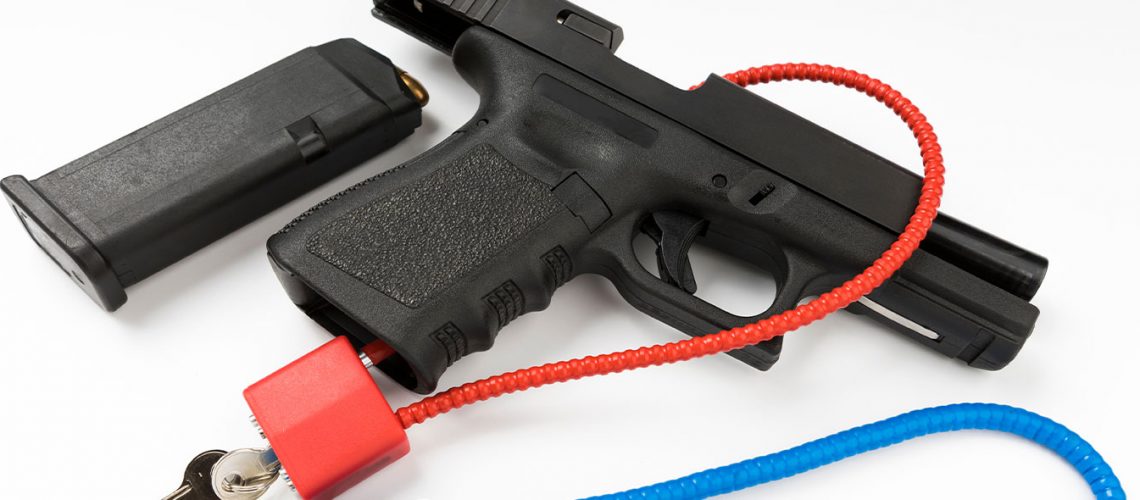Having a gun lock doesn’t prevent a gun owner from keeping it unlocked in situations where a lock would just slow down the essential defensive use of their firearm.
However, it CAN allow a gun owner to make sure nobody gets to shoot the firearm in situations where they simply don’t want it to be used.
And, gun locks have a legal component that manufacturers and dealers have to consider.
CHILD SAFETY LOCK ACT OF 2005
On April 24th, 2006, an amendment to the Gun Control Act became effective. The Child Safety Lock Act of 2005 states that it’s unlawful for “any licensed importer, manufacturer, or dealer to sell, deliver, or transfer any handgun to any person, other than another licensee, unless the transferee (buyer) is provided with a secure gun storage or safety device for that handgun.”
Simply meaning, if your business sells or transfers handguns, they have to come with a gun storage or safety device.
The intent of the law was to prevent unauthorized people—like children—from gaining access to, or being able to fire, handguns.
While this requirement technically only applies to handguns, some manufacturers voluntarily include similar locks with rifles and shotguns. State law or agencies (such as the California DOG, for instance) may occasionally provide more stringent requirements for locks or security devices from the manufacturer.
PRIVATE PARTY
Of course, these requirements are binding upon licensed manufacturers. For private party sales, these requirements don’t apply across the board—although some states and jurisdictions have more stringent requirements than others. Always check to know the laws that pertain to you in your area.
PROJECT CHILDSAFE
The firearms industry (NSSF, in this case) offers safety education and free firearm safety kits, which include a cable-lock, and reading material that teaches safe handling and storage guidelines.
Since 1999, over 15,000 partner law enforcement agencies had distributed 40 million locks to gun owners in all 50 states.
So, with that in mind, what kind of gun locks or storage methods are there?
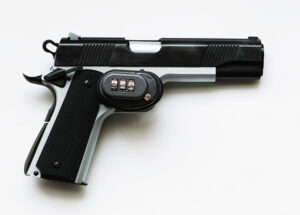 TRIGGER LOCKS
TRIGGER LOCKS
Trigger locks are easy enough to find, and they’re inexpensive. But there are some drawbacks.
Usually, they’re two pieces that cover each side of a trigger guard, connected by a rod that goes through the trigger guard.
They can be unlocked by push button, combination, or even a key. Some models are battery operated, some have lighted keypads—and there are even models with anti-tamper alarms.
However, many believe that triggerlocksshouldn’t be used on loaded guns, yet a trigger lock does not prevent a firearm from being loaded, which…sort of defeats the purpose, doesn’t it?
You can get a trigger lock for $5 to $35.
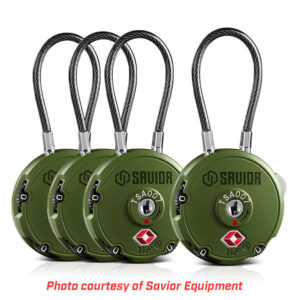 CABLE LOCKS
CABLE LOCKS
A cable lock is pretty much what it says.
It’s a looped cable that meets at both ends in the lock. The cable is run through the firearm’s firing chamber to block the insertion of ammunition, and to keep the weapon from firing.
It’s simple, and very effective (unless someone has a bolt cutter—but even then, cutting the cable isn’t exactly a lightning-quick subversion of the lock). Most cable locks make use of a combination of a key to be unlocked. And they can be had for the wonderful price of FREE to around $20 or so.

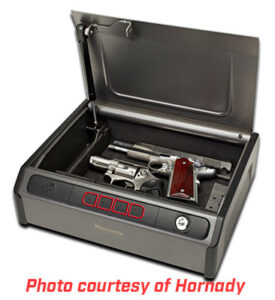 LOCKBOXES
LOCKBOXES
Lockboxes are simply a small box—often the size of a small briefcase—with a heavy-duty lock. They can be expensive, but they’re versatile enough to hold many sizes of handgun. And, mobile enough to travel with.
Push buttons, combinations, digital keypads, or even a key can unlock a lockbox. The cost of a lockbox is usually in the neighborhood of $40 to $200.

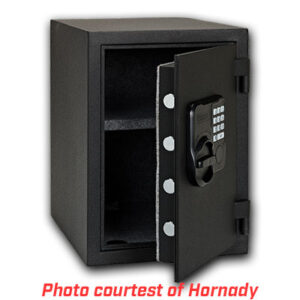 GUN SAFE
GUN SAFE
Not a lock, but more of a lockdown.
Especially effective if you have more than one weapon. And, if it’s large enough, especially good at securing long weapons.
Of course, the weight and size of a gun safe will determine where you can place it. Then, there’s the expense. Not to mention the lack of mobility.
But, if you’ve made an investment in a variety of firearms and want to secure them, making an investment into a gun safe is a prudent, if not cheap, move.
Push buttons, keypads or a combination can unlock a gun safe.
A gun safe could cost $100 from Harbor Freight, or it could cost over $2,000 from a reputable American manufacturer. There is a wide range of quality and materials. And, as with most things in this space, you usually get what you pay for. If your goal is just to keep a child’s hands and eyes away from a firearm, a fairly simple solution may be fine. If you want true theft prevention and a fire safety rating, look at the higher end of the spectrum.
For more tips and info on how to store your ammo and firearms, look HERE and HERE.
No matter how you choose to control access to your firearms, there are a variety of ways to make it happen. From the free locks available, to an expensive gun safe, there is sure to a manner of controlling access to your firearm while controlling its ability to be fired, within your budget and choice of security.
